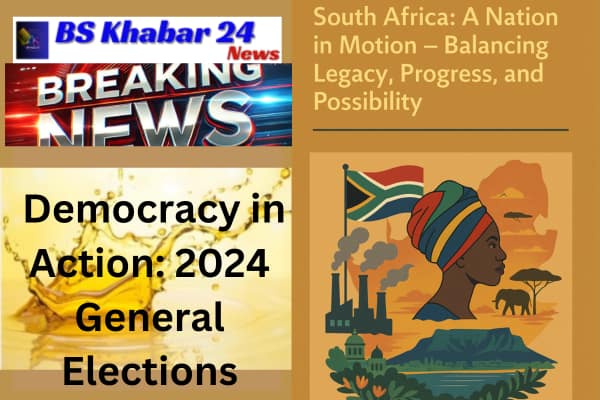South Africa: A Nation in Motion – Balancing Legacy, Progress, and Possibility Strong
South Africa: A Nation in Motion – Balancing Legacy, Progress, and Possibility
By [BS Khabar24 News], News Blog Contributor
As one of Africa’s most powerful and vibrant nations, South Africa is a place of contrasts, colour, and culture. The nation is still a major attraction on the continent because of its fascinating history, breathtaking scenery, and hardy people. Today, South Africa must strike a balance between its history of hardship and its vision of a brighter, more just future.
South Africa: A Nation in Motion
It is hard to discuss South Africa without mentioning its complicated history. Apartheid, which separated individuals based on privilege and race, influenced the political and social structure of the country for many years. However, a new democratic age began with the overthrow of apartheid in the early 1990s, spearheaded by leaders like Nelson Mandela and Desmond Tutu. A constitution based on equality and human rights was ushered in by the first multiracial elections in 1994, which gave people optimism.
However, the effects of apartheid are being felt even thirty years later. With unemployment rates consistently exceeding 30% and unequal access to high-quality healthcare and education, economic inequality is still very much present. Nevertheless, the nation has continued to advance in spite of the difficulties.
Democracy in Action: 2024 General Elections
In one of the most important general elections since the end of apartheid, South Africans went to the polls in May 2024. Younger voters called for change as their disenchantment with conventional parties, particularly the ruling African National Congress (ANC), grew.
According to preliminary data, the ANC’s support was declining, which was indicative of dissatisfaction with energy issues, corruption scandals, and slow economic growth. Indicating a move towards coalition politics in future rule, opposition groups such as the Democratic Alliance (DA) and Economic Freedom Fighters (EFF) gained popularity. According to political commentators, this might mark a sea change that requires more cooperation and accountability between parties.
For many South Africans, the election was about taking back their future and voice, not just about politics.
Power Woes and Progress
Energy insecurity has emerged as one of the nation’s most urgent problems in recent years. Scheduled power outages, or load shedding, have become the annoying standard, ruining businesses and interfering with day-to-day activities. The state-owned electricity company Eskom has suffered from poor management and antiquated infrastructure.
But things are about to change. By investing in renewable energy through the Independent Power Producer Procurement Programme (IPPPP), the government has increased its attempts to diversify its energy sources. With the emergence of wind and solar farms in places like the Northern Cape, there is promise for a more dependable and sustainable future.
Energy investment from the private sector is also rising as more companies look for ways to remain lucrative and productive. In addition to being a necessity, South Africa’s transition to green energy presents a chance for innovation, job growth, and African climate leadership.
Culture, Tourism, and Ubuntu
Among South Africa’s greatest advantages are still its natural beauty and cultural variety. Millions of tourists visit the nation each year, drawn by its famed Table Mountain in Cape Town and its wildlife-rich Kruger National Park. The tourism industry was severely impacted by the pandemic, but it has recovered well because of global campaigns and rising interest in eco-tourism.
However, South Africa’s people, customs, and spirit are more than just its natural beauty. Ubuntu, which translates to “I am because we are,” continues to shape how communities help one another overcome hardship. South Africans have a strong sense of community and resiliency, whether it is through community-based initiatives to provide food for the hungry or local artists conserving indigenous languages via music and cinema.
Youth and Innovation
The youth of South Africa, who make up more than 60% of the population, are influencing the country’s destiny. Young businesspeople are reinventing what it means to be South African, from fashion hotspots in Durban to software firms in Johannesburg.
By bridging the gap between education and employment, programs such as the Youth Employment Service (YES) are providing young people with a competitive edge in a competitive labour market. New opportunities for innovation in the fields of finance, health, and education have also been made possible by the growth of digital platforms and mobile banking.
The young people of South Africa are not just tomorrow’s leaders, but also today’s disruptors.
The Road Ahead
The journey of South Africa is far from finished. Among the major issues the country still faces are environmental problems, crime, and inequality. Its diversity, democratic basis, and populace’s will, however, are its greatest assets.
The challenge facing South Africa as it looks to the future is not if it can rise, but rather how. This Rainbow Nation has the potential to become a 21st-century model for inclusive, sustainable development with the correct leadership, funding, and grassroots drive.
Nelson Mandela famously said, “It always seems impossible until it’s done.” The road ahead for South Africa may be lengthy, but the opportunities are limitless.







1 thought on “South Africa: A Nation in Motion – Balancing Legacy, Progress, and Possibility Strong”